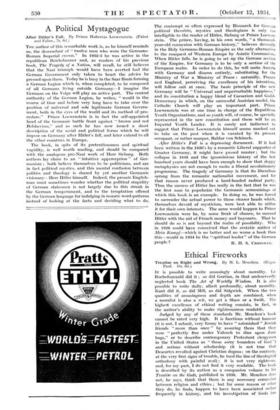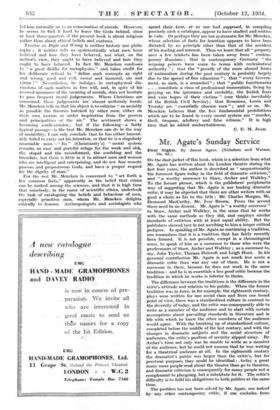Ethical Fireworks
IT is possible to write amusingly about morality. La Rochefoue,auld did it ; so did Gratian, in that undeservedly neglected book The Art of Worldly Wisdom. It is also possible to write dully, albeit profoundly, about morality. Kant did it, so did 'Mill, so did Sidgwick. When the two qualities of amusingness and depth are combined, when a moralist is also a wit, we get a Shaw or a Swift. The highest excellence of ethical writing consists, in fact, in the author's ability to make righteousness readable.
Judged by any of these standards Mr. Mencken's book cannot be rated very high. It is facetious without humour (it is not, I submit, very funny to have " astonished " Jewish friends "more than once" by assuring them that they were "perfectly free under Yahweh to dine upon June bugs," or to describe contemporary Protestant clergymen in the United States as "those sorry bounders of God ") and serious without scholarship (it is not true that Descartes revolted against Christian dogma; on the contrary, at the very first signs of trouble, he toed the line of theological orthodoxy with painful zeal) ; it is not very righteous, and, for my part, I do not find it very readable. The book is described by its author as a companion volume to his Treatise on the Gods, published in 1930. Mr. Mencken does not, he says, think that there is any necessary connexion between religion and ethics ; but for some reason or other they do, he finds, happen to have been associated rather led him naturally on to an examination of morals. However, he seems to find it hard to leave the 'Gods behind, since at least three-quarters of the present book is about religious rather than about -ethical beliefs and, customs.
Treatise on Right and Wrong is neither history nor philo- sophy ; it neither tells us systematically what men have
believed and how they have behaved, nor what, on the author's view, they ought to have believed and hoix they ought to have behaved. In fact Mr. Mencken confesses to a great dislike for metaphysics" and takes credit for his deliberate refusal to " defme such concepts as right and wrong, good and evil, moral and immoral, sin and
Virtue ! " Nevertheless, he indulges in metaphysical dis- cussions of such matters as free will, and, in spite of his avowed ignorance of the meaning of morals, does not hesitate to pass frequent moral judgements: Where Christians are concerned, these judgements are almost unifonnly harsh. Mr. Mencken tells us that his object is to criticize "as amiably as possible the theories hatched by other men, either on their own motion or under inspiration from the powers and principalities of the air." The sentiment shows a becoming condescension ; but if the following—a fairly typical passage—is the best Mr. Mencken can do in the way of amiability, I can only conclude that he has either lament- ably failed to carry out his intention, or that he is a singularly unamiable man.--" Its" (Christianity's) "moral system re-mains an easy and grateful refuge for the weak and sick, the stupid and the misinformed, the confiding and the irresolute, but there is little in it to attract men and women who are intelligent and enterprising, and do not fear remote gaseous and preposterous Gods, and have a proper respect for the dignity of man."
For the rest Mr. Mencken is concerned to "set forth a few common facts," apparently in the belief that ethics can be ranked among the sciences, and that it is high time that somebody, in the name of scientific ethics, undertook the task of cataloguing the beliefs and behaviour of men, especially primitive men, whom Mr. Mencken delights ethically to honour. Anthropologists and sociologists who spend_lbeirAirne, or so one had supposed, in compiling precisely-such a catalogue, appear to have studied and written in vain. Or perhaps they are too systematic for Mr. Mencken, whose selection of facts for -insertion appears to have been dictated by no principle other than that of the accident of his reading and interest. Thus we learn that all " property save a few, trinkets has been taken away from" contem- porary Russians ; that in contemporary Germany "the reigning pOwers have come to terms with ecclesiastical authority " ; that the `k growth of the. more absurd forms of nationalism during ,the past century -ia probably largely due to the spread of free education " ; that "every Govern- ment, as such, is a scoundrel" ; that "public functionaries . . . constitute a class of professional immoralists, living by preying on the ignorance and credulity, the foolish fears and vain hopes of their victims" (one thinks inevitably of the British Civil. Service) ; 'that RousSeau, Lenin and Trotsky are "essentially obscure men " ; and so on. Mr. Mencken believes _that the, five fundamental prohibitions which are to be found in every moral system are "murder, theft, trespass, adultery and false witness." It is high time that he added uncharitableness.
C. E. M. Joan.















































 Previous page
Previous page